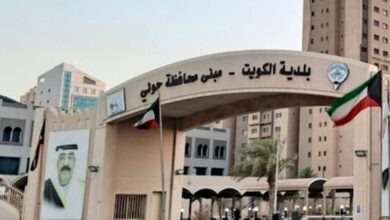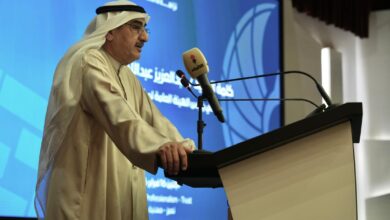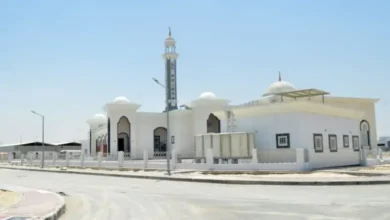Gulf Summit sets path to economic integration and unified security framework
The Supreme Council emphasized coordinated efforts to strengthen GCC solidarity and stability, protect interests, prevent conflicts, and fulfill citizens’ aspirations, while welcoming the UAE’s presidency of the 46th session in Abu Dhabi with strong anticipation for a successful summit.

• The Supreme Council reaffirmed its commitment to regional peace and stability, supporting the UAE’s sovereignty over its three occupied islands, urging Iran to uphold good neighborliness and reject terrorism, and calling for comprehensive reforms and government control in Lebanon.
• The Supreme Council reiterated its unwavering support for Iraq’s security and stability and praised the ongoing positive partnership between the GCC and Iraq and emphasized completing the electrical interconnection project to link Iraq to the GCC electricity grid.
• The Supreme Council stressed the need for an integrated plan for the Palestinian Authority’s return to Gaza, rejecting any separation from the West Bank and advocating for a unified Palestinian state and a two-state solution.
• The Supreme Council expressed support for Security Council Resolution 2732 (2024), reaffirmed adherence to Resolution 2107 (2013), and advocated for appointing a high-level coordinator to oversee Kuwait’s humanitarian and national files after the end of UNAMI.
In its final statement at the 45th session held in Kuwait, the Supreme Council of the Gulf Cooperation Council (GCC) expressed profound sorrow over the passing of His Highness Sheikh Nawaf Al-Ahmad. Praising his life of remarkable achievements, tireless dedication, and sincere efforts for Kuwait’s progress and prosperity, the Council prayed for God’s mercy and blessings upon him, Al-Rai newspaper reported.
The Council extended its heartfelt condolences and deep sympathy to the State of Kuwait—its leadership, government, and people—as well as to the Arab and Islamic nations, on this profound loss.
The Council also expressed sincere appreciation for the late Sheikh Nawaf Al-Ahmad’s role in strengthening the Gulf Cooperation Council (GCC) alongside his fellow GCC leaders. They recognized his significant efforts, may God have mercy on him, in supporting Arab and Islamic causes, fostering goodwill for humanity, and promoting peace in the region and the world.
GCC hails His Highness Sheikh Meshal Al-Ahmad Al-Jaber Al-Sabah’s leadership
The Supreme Council congratulated His Highness the Amir Sheikh Meshal Al-Ahmad Al-Jaber Al-Sabah on assuming the reins of government in Kuwait, expressing confidence that his wisdom will enhance Kuwait’s active participation in advancing the GCC’s objectives. Alongside the leaders of the GCC, His Highness is expected to uphold the security of the Gulf, strengthen its foundations, and contribute to the stability and prosperity of the GCC countries and their peoples.
The Supreme Council also extended deep appreciation and gratitude to Sheikh Tamim bin Hamad Al-Thani, Emir of Qatar, and his government for their exceptional efforts during Qatar’s presidency of the 44th session of the Supreme Council. It acknowledged the significant milestones achieved under his leadership.
Additionally, the Council congratulated His Highness the Amir Sheikh Meshal Al-Ahmad Al-Jaber Al-Sabah on Kuwait’s assumption of the presidency for the 45th session, wishing success in further advancing the GCC’s progress across all sectors.
GCC congratulates Donald Trump on his victory
The Supreme Council congratulated U.S. President-elect Donald Trump on his victory in the presidential election, expressing eagerness to strengthen the historic and strategic relations between the GCC and the United States. The Council emphasized its commitment to working together to promote peace and stability in the region and the world.
Vision of the Custodian of the Two Holy Mosques
The Supreme Council reviewed the General Secretariat’s report on progress in implementing the vision of the Custodian of the Two Holy Mosques, King Salman bin Abdulaziz Al Saud, aimed at promoting joint Gulf action. This vision, approved during the 36th session in December 2015, emphasizes full, accurate, and continuous implementation.
Key elements include achieving economic unity, developing shared defense and security systems, coordinating efforts to enhance solidarity and stability among GCC countries, safeguarding their interests, avoiding regional and international conflicts, and fulfilling citizens’ aspirations.
It also focuses on strengthening the GCC’s regional and international presence by unifying political positions and building strategic partnerships with the global community, international organizations, and friendly nations.
Joint Gulf cooperation
The Supreme Council reviewed consultations regarding its 33rd session’s decision on advancing the proposal by the late Custodian of the Two Holy Mosques, King Abdullah bin Abdulaziz Al Saud, to transition from cooperation to a union. It directed the Ministerial Council and the Chairman of the Specialized Body to complete the required measures and submit their findings at the next Supreme Council session.
The Council reiterated its commitment to the strength and cohesion of the GCC, unity among its members, and greater coordination, integration, and interdependence across all sectors to meet the aspirations of GCC citizens. It also emphasized collective action in response to any threats against member states.
Military cooperation among GCC countries
The Supreme Council approved recommendations from the Joint Defense Council’s 21st session, expressing satisfaction with progress in military integration among GCC armed forces. The Council commended joint military exercises, coordination meetings, and security evaluations conducted throughout 2024.
It also endorsed the Joint Defense Council’s recommendation to appoint Major General Abdulaziz bin Ahmed bin Salem Al-Balawi as Commander of the Unified Military Command of the GCC, wishing him success in his mission.
Renewing the appointment of GCC Secretary-General
The Supreme Council decided to renew the appointment of Jassim Al-Budawi as Secretary-General of the Cooperation Council for the Arab States of the Gulf for another three years, starting February 1, 2026. This decision reflects appreciation for his significant efforts and contributions to advancing the Council’s progress. The Council wished him continued success in his role.
UAE’s presidency of the 46th session welcomed
The Supreme Council welcomed the United Arab Emirates’ presidency of its 46th session, scheduled to convene in Abu Dhabi, and expressed its anticipation for a successful summit.
Al-Durra field
The Supreme Council reaffirmed that the Al-Durra field lies entirely within the maritime areas of Kuwait. It emphasized that the natural resources in the submerged area adjacent to the Saudi-Kuwaiti divided zone, including the entire Al-Durra field, are the shared property of Saudi Arabia and Kuwait.
The Council underscored that only these two nations have the right to exploit the resources in accordance with international law and their bilateral agreements. It categorically rejected any claims by third parties regarding rights to this field or the submerged area.
Unwavering support for Iraq’s security and stability
The Supreme Council reiterated its unwavering support for Iraq’s security and stability and praised the ongoing positive partnership between the GCC and Iraq. It emphasized completing the electrical interconnection project to link Iraq to the GCC electricity grid.
The Council called on Iraq to resume meetings of the legal and technical teams responsible for demarcating the border beyond Border Mark No. 162 and urged Iraq to respond to Kuwait’s request to resume the meetings of the Kuwaiti-Iraqi Joint Committee for regulating maritime navigation in Khor Abdullah.
The Supreme Council stressed the importance of Iraq respecting Kuwait’s sovereignty and territorial integrity and adhering to bilateral and international agreements, including all relevant United Nations resolutions, particularly Security Council Resolution No. 833 (1993), which pertains to land and maritime border demarcation.
It urged Iraq to expedite the completion of maritime border demarcation beyond Maritime Mark 162 and abide by the Convention on the Regulation of Maritime Navigation in Khor Abdullah. The Council rejected the reasons cited by Iraq’s Federal Supreme Court regarding this issue, as well as any unilateral actions or decisions related to the Khor Abdullah Agreement, deeming them invalid and void.
Kuwait’s humanitarian and national files
The Supreme Council expressed its support for Security Council Resolution 2732 (2024) and emphasized the importance of ongoing Security Council oversight regarding the files of Kuwaiti prisoners, missing persons, property, and national archives.
It reaffirmed adherence to the framework set by Security Council Resolution 2107 (2013), which established the reporting mechanism for Kuwait-related issues under the Security Council.
The Council advocated for the appointment of a high-level coordinator by the UN Secretary-General to oversee Kuwait’s humanitarian and national files following the termination of the United Nations Assistance Mission for Iraq (UNAMI). It noted that a similar mechanism, previously implemented, had proven successful in achieving positive outcomes.
Stability and security of GCC nations
The Supreme Council reiterated the GCC States’ commitment to maintaining stability and security in the region and supporting the prosperity of their peoples. It emphasized respect for the principles of sovereignty and non-interference in internal affairs, based on international conventions, norms, and laws.
The Council rejected any threats to any member state, stressing that the security of the GCC countries is inseparable, in line with the principle of common defense, collective security, the GCC statute, and the mutual defense agreement. It also affirmed that the security of the GCC countries is a key element of Arab national security and rejected foreign interventions in Arab countries from any party.
Support for the Palestinian people’s sovereignty
The Supreme Council emphasized the importance of preparing an integrated plan for the Palestinian Authority’s return to the Gaza Strip and rejected any measures aimed at separating Gaza from the West Bank. It stressed that any discussions regarding the future of Gaza must be framed within the context of a unified Palestinian state and called for a comprehensive approach to implementing the two-state solution.
The Council reaffirmed the centrality of the Palestinian cause and the need to end the Israeli occupation. It expressed its support for the sovereignty of the Palestinian people over all occupied Palestinian territories. The Council urged all countries to proceed with recognizing the State of Palestine and take urgent collective action to secure a permanent solution, ensuring the establishment of an independent Palestinian state on the 1967 borders, with East Jerusalem as its capital, in line with the Arab Peace Initiative and international resolutions.
Iran’s occupation of the UAE’s three islands
The Supreme Council reaffirmed its firm stance and previous decisions regarding Iran’s continued occupation of the three islands (Greater Tunb, Lesser Tunb, and Abu Musa), which belong to the United Arab Emirates, and emphasized the following:
- Support for the UAE’s sovereign rights over the three islands and their territorial waters, airspace, continental shelf, and exclusive economic zone as an integral part of the UAE.
- Denouncement of any decisions, practices, or actions taken by Iran regarding the three islands, which are deemed null and void and do not alter the historical and legal facts concerning UAE sovereignty.
- A call for Iran to engage in direct negotiations with the UAE or resort to the International Court of Justice to resolve the issue.
The Supreme Council condemned Iran’s ongoing construction of housing facilities to settle Iranians on the three occupied UAE islands, as well as the positions and escalatory measures taken by the Iranian authorities.
The Council condemned Iran’s military exercises involving the three islands, territorial waters, airspace, continental shelf, and exclusive economic zone of the UAE islands, along with the repeated visits of senior Iranian officials to the islands.
Countering terrorism and extremism
The Supreme Council reaffirmed its firm stance against terrorism and extremism, regardless of their source, and rejected all forms and justifications of these threats. It expressed its commitment to drying up their sources of financing and supporting international efforts to combat terrorism.
The Supreme Council condemned the continued foreign support for terrorist groups and sectarian militias in the Middle East, which threaten Arab national security, destabilize the region, and undermine international counter-terrorism efforts, especially those of the international coalition against ISIS.
GCC stresses Iran’s commitment to UN Charter and international law
The Supreme Council reaffirmed its firm positions and resolutions regarding relations with Iran, emphasizing the need for Iran’s commitment to the core principles outlined in the Charter of the United Nations and international law. These principles include respect for state sovereignty, non-interference in internal affairs, the peaceful resolution of disputes, the non-use or threat of force, and the rejection of terrorism, extremism, and sectarianism.
The Supreme Council expressed the GCC countries’ concern over developments in the Iranian nuclear issue, stressing the importance of swiftly reaching constructive understandings to maintain regional security and stability. It also reiterated the GCC countries’ readiness to cooperate and engage effectively with this issue, including participating in all negotiations, discussions, and regional and international meetings related to it. These negotiations should address not only the Iranian nuclear program but also the security concerns of the GCC countries, such as ballistic missiles, cruise missiles, drones, and the safety of international navigation and oil facilities.
The Supreme Council emphasized the importance of Iran’s commitment to adhering to the uranium enrichment limits required for peaceful purposes and fulfilling all obligations while fully cooperating with the International Atomic Energy Agency (IAEA).
The Supreme Council stressed the need to maintain maritime security and protect regional waterways, addressing activities that threaten the security and stability of the region and the world. This includes targeting commercial vessels, threatening shipping lanes, international trade, and oil facilities in the GCC countries.
GCC reaffirms support for regional stability, peace efforts in Yemen, Syria, Lebanon, and beyond
The Supreme Council affirmed its full support for the Presidential Leadership Council headed by Dr. RashadMohammed Al-Ulaimi, and the entities supporting it, to achieve security and stability in Yemen and reach a comprehensive political solution, in accordance with the Gulf Initiative and its executive mechanism, the outcomes of the Comprehensive National Dialogue Conference, and Security Council Resolution 2216, in a way that preserves the sovereignty, unity, territorial integrity, and independence of Yemen.
The Supreme Council welcomed the continued sincere efforts by the Kingdom of Saudi Arabia and the Sultanate of Oman, as well as their contacts with all Yemeni parties to revive the political process, leading to a comprehensive and sustainable political solution in Yemen. It emphasized the importance of the Houthis‘ positive engagement with international efforts to end the Yemeni crisis and seriously address peace initiatives, alleviating the suffering of the Yemeni people.
The Supreme Council expressed deep concern over the ongoing developments in the Red Sea region and the Gulf of Aden, stressing the importance of de-escalation to maintain regional security and stability and uphold the right to maritime navigation.
The Supreme Council reaffirmed its firm stance on preserving the territorial integrity of the Syrian Arab Republic, respecting its independence and sovereignty, rejecting regional interference in its internal affairs, supporting the UN’s efforts to reach a political solution in Syria in line with Security Council Resolution 2254, and looking forward to resuming the work of the Syrian Constitutional Committee.
The Supreme Council welcomed the ceasefire agreement in Lebanon for 60 days, hoping it will serve as a step toward ending the war, securing Israel’s withdrawal from Lebanese territory, implementing Security Council Resolution 1701, and facilitating the return of displaced persons to their homes. It condemned the Israeli attacks, which have caused thousands of civilian casualties and destroyed infrastructure, as well as civilian and health facilities.
The Supreme Council reaffirmed the GCC’s firm stance with the Lebanese people and its continuous support for Lebanon’s sovereignty, security, and stability. It stressed the importance of implementing comprehensive political and economic reforms to ensure Lebanon overcomes its crisis and does not become a breeding ground for terrorism, drug smuggling, or other criminal activities that threaten regional security.
The Supreme Council stressed the need to implement Security Council Resolution No. 1701 to restore permanent security and stability in Lebanon, ensure respect for its territorial integrity, political independence, and sovereignty within its internationally recognized borders, and extend the control of the Lebanese government over all Lebanese territories, in accordance with the relevant Security Council resolutions and the TaifAgreement.
The Supreme Council affirmed the firm positions and resolutions of the Gulf Cooperation Council on the importance of preserving the sovereignty, security, stability, and territorial integrity of Sudan, and reiterated its support for the brotherly Libyan state, the Libyan-Libyan political solution, and the resolutions of the Security Council.
The Supreme Council stressed the importance of the special strategic partnership between the Gulf Cooperation Council and the brotherly Kingdom of Morocco, as well as the implementation of the Joint Action Plan. It also reaffirmed its firm positions and decisions supporting the Moroccan Sahara and preserving the security, stability, and territorial integrity of the Kingdom of Morocco.
Strengthening partnerships
The Supreme Council praised the outcomes of the first joint summit between the GCC and the European Union,held on October 16, 2024, in Brussels, Belgium, and stressed the importance of swiftly implementing the agreements made at this summit. It also directed the strengthening of economic relations between the GCC and countries and international blocs to achieve common trade and investment interests.
The Council welcomed the joint statement on the conclusion of free trade agreement negotiations with South Korea, the joint statement with New Zealand, and the joint statement to begin free trade negotiations between the Cooperation Council and the Republic of Turkey.












